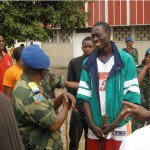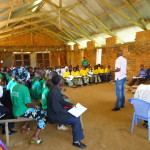Tomorrow IS a new day

Civilian and military discuss solutions to challenges at the Lobi Mokolo Ya Sika workshop. (Photos: Ilunga Kalala)
By Ilunga Kalala
Kinkole is approximately 30k due northwest of Kinshasa. It is one of the more popular ports near the Congo River and thus, for a long time, a common weekend escape for residents of the city of Kinshasa. It was also the site of Lobi Mokolo Ya Sika’s (LMYS) first joint activity of the summer. Lobi Mokolo Ya Sika (“Tomorrow is a New Day”) is SFCG’s program to improve civilian-military relations and increase the accountability of the armed forces. It utilizes media, targeted trainings around key issues and facilitated discussions.
During the planning portion of the activity, I descended upon the city with Mao Makusudi Omari, our local partner from ECC Meru (Church of Christ in Congo – Ministry of Refugees and Emergencies) to meet with the LMYS Naval Base organizing committee and Colonel Bayumbo Zikpe-Lembe of the LMYS steering committee. After our meeting and at the Colonel’s request, I tried maboke, a local fish cuisine that is all the rage (and for good reason), while we discussed the history of Kinkole.
“Nkole means slave,” Colonel Bayumbo explained.
“This,” he said motioning to the area surrounding us, “is where the slaves were.”
He went on to describe how captured slaves destined for the transatlantic slave trade were brought to Kinkole and then made their way to Matadi towards the Atlantic Ocean.
It was with this history in mind that he began to describe the reality that current residents face every day. Sometime earlier this year a man in uniform killed a civilian in Kinkole. To date no one has been arrested and the perpetrator remains at large. In addition to this death, incidents of nocturnal crime by armed men and other violations of human rights, there is a palpable feeling of insecurity in the community that has widened an already significant chasm between the military and civilian population.
The organizing committee of the Naval Base put together an ambitious plan to bring together the community and address the issue of insecurity. Their hope was to encourage the civilian population to come forward with the evidence necessary to put whoever was responsible for the crime behind bars. More importantly they wanted to educate the civilian population on how the military justice system works.
The workshop was powerful. Theophile Kisenge, President of Civil Society Association, addressed security and insecurity generally in defining the terms and then discussing the elements that promote insecurity.
Major Fabien Kiaku Mambuki, Secretary of the LMYS steering committee, gave a captivating overview of human rights and the history of law respecting human rights in the Congo. Finally, Captain Charles Genda of the military prosecutor’s office of Kinshasa provided an expose of the criminal cases brought against military soldiers and how essential the public was to the justice process.
To mix things up, Mao, our partner from ECC MERU led an exercise, which matched up civilians and soldiers in a lively trivia challenge.
Workshop participants split into two groups and collaborated on a list of recommendations that including both long-term and short-term proposals for combating insecurity in Kinkole. Several notable recommendations included:
- A local effort to provide for a city bell and whistles
- The identification of the homeless on the streets of Kinkole
- A nocturnal patrol
- Sensitization of the civilian population
- Street lighting in neighborhoods to reduce crime
- The identification of military and police residing in the city by a serial number
I think the value and impact of the first workshop can best be summed up by a participant and Kinkole resident named Bolumbuekofo who said.
“This workshop helped us a lot. It has provided us with useful instruction, reliable information, and a sense of security in our Commune of N’Sele. There is now a reunification between civilians and the military.”
###
Ilunga Kalala is an international intern with SFCG in DRC. See what else we’re doing in the Congo.









